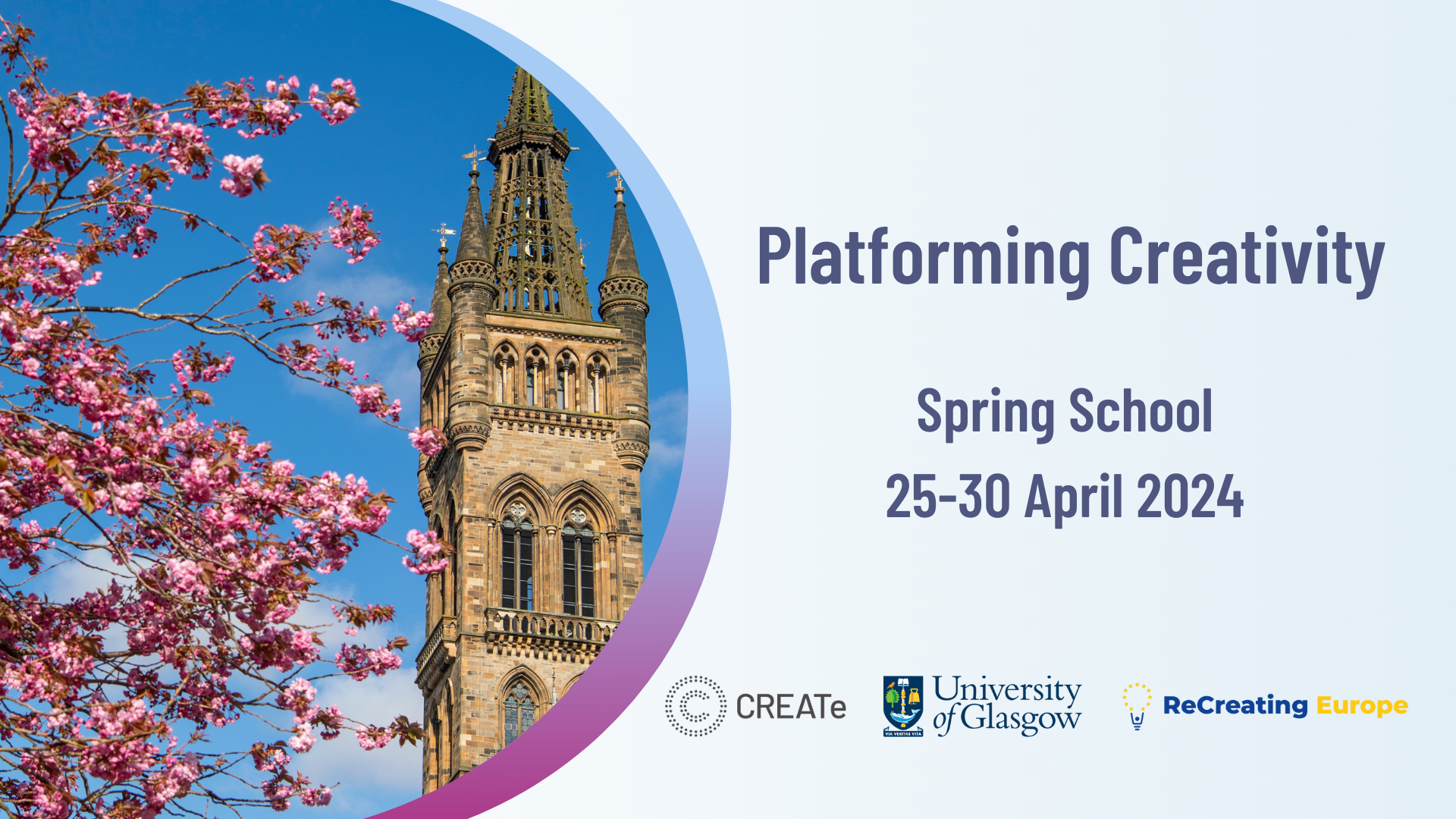We are excited to announce CREATe’s first-ever Spring School. In April 2024 CREATe joins forces with reCreating Europe to bring together expertise of copyright, competition and tech regulation scholars in a single space. This interdisciplinary school on ‘Platforming Creativity’ uses different lenses to consider the effects digital technology and platforms have on the cultural and creative industries, and how those effects are being addressed by legislators and policy makers in Europe.

Cultural and creative industries play an important role in modern economies, fostering innovation, creating jobs, and significantly contributing to economic growth. But their primary role is that of fostering cultural diversity and development of our society, providing an outlet for people’s creativity and expression. Digitalisation and rapid technological progress have created unprecedented opportunities for creators, bringing diversity of available content. At the same time, access to cultural and creative goods is now mediated by a new class of gatekeepers, particularly digital platforms, exacerbating the imbalances between content creators and producers. The changing dynamics within the creative and cultural industries, together with the Covid-19 pandemic and the recent raise of generative AI tools, resulted in the European legislators’ activism, not limited to the copyright domain. Digital platforms have had profound effects on the cultural and creative industries, which are being considered to varying extent by legislators and policy makers in Europe. The Spring School will address the current discussions from three perspectives: creativity (copyright), markets (competition law) and technology (tech regulation), with each perspective addressed on a separate day. All three perspectives are brought together on the last day, during a distinguished keynote.
Participants in the Spring School will learn from leading experts in these fields, from CREATe, reCreating Europe partners, and beyond. Confirmed speakers include: Ruth Towse (Professor of Economics of Creative Industries, Bournemouth University), Péter Mezei (Professor of Law, University of Szeged), Thomas Margoni (Research Professor of Intellectual Property Law, CiTiP, KU Leuven), Joost Poort (Associate Professor, IViR, University of Amsterdam), Konstantina Bania (Partner at Geradin Partners, Senior Lecturer at Brunel University London) as well as following members of CREATe: Ula Furgał (Lecturer in Intellectual Property and Information Law), Amy Thomas (Lecturer in Intellectual Property and Information Law), Stavros Makris (Lecturer in Competition Law), Magali Eben (Senior Lecturer in Competition Law, Dep. Dir.), Kris Erickson (Professor of Social Data Science, Dep. Dir.), and Martin Kretschmer (Professor of Intellectual Property Law, Director of CREATe), with the support of Bart Meletti (Copyright Education Creative Director).
Spring School participants will have an exceptional opportunity to explore these topics in one of the foremost research centres focused on evidence-driven policy for the creative industries. CREATe, the Centre for the Regulation of the Creative Economy, currently core funded by AHRC, plays an important role in the research ecosystem and practice in creative industries. It has developed important resources for creative industries, including historical and evidence repositories, and has built interdisciplinary capacity at the interface of law, technology, social sciences and humanities. This interdisciplinary approach is vital to understand the challenges facing creative industries – and to effectively respond to them.
Who can apply?
The Spring School welcomes applications from doctoral and advanced master students, early career researchers, industry representatives and policy makers with an interest in cultural and creative industries. The Spring School is taught on a postgraduate level and participants should have some but not exhaustive prior knowledge on at least some of the topics. The Spring School will touch upon EU copyright law, competition law, digital regulation and technology. Reading materials will be made available to the Spring School participants.
The number of School participants is limited to 15-20 people. Anyone who is interested is welcome to apply by 14 February. Candidates will be notified of the application results by 29 February 2024.
How to apply
The online applications are now open. They have been extended until 14 February 2024, 23:59. To apply, fill in the application form on the Spring School page on CREATe’s website.
Upon application, candidates will be asked to provide a CV (of maximum 3 pages) and a short statement of motivation, explaining why they want to participate in the Spring School and why they make a good candidate (max 500 words).
The fee for participation in the Spring School is 400 GBP. The fee includes tuition, coffee, lunches and reception. A limited number of scholarships are available upon request during the application process.
In case of questions about the Spring School please contact Dr Ula Furgał (ula.furgal@glasgow.ac.uk) or Dr Magali Eben (magali.eben@glasgow.ac.uk)
Where will the Spring School take place?
The Spring School will take place at the University of Glasgow in Glasgow, Scotland (United Kingdom) from 25 to 30 April 2024.
Founded in 1451, the University of Glasgow has for centuries been a cradle for revolutionary ideas and exceptional thinkers, such as the famous ‘father of modern economics’ Adam Smith. It remains home to exceptional research and teaching, taking place on the stunning campus which combines Gothic architecture with the best modern campuses have to offer. The Spring School will be taught principally in the Advanced Research Centre, a high-tech building housing 500 multidisciplinary researchers from all four of the University’s colleges: Social Sciences, Arts, Science and Engineering, and Medical/Veterinary and Life Sciences.
The University of Glasgow is situated in the leafy, green west end of Glasgow, which is also home to the impressive collections of art, natural history, and cultural heritage in the Hunterian museums and Kelvingrove Art Gallery.
Glasgow is also well-situated to explore the extraordinary natural beauty of Scotland, with lochs (lakes), munros (mountains), and nature reserves less than an hour away. An outing into Scotland’s beautiful nature will be part of the Spring School.









